Contributing Editors for this page include Stacy Hoeflich
Ranking
#20 on the list of 150 Most Teachable Lincoln Documents
Annotated Transcript
Context. In the fall of 1859, Abraham Lincoln received an invitation from the Young Men’s Republican Club of New York to join a prominent speakers series designed to introduce likely presidential candidates and leading Republicans, especially from the “West,” to New York audiences. Lincoln eagerly accepted the invitation but asked for extra time to prepare his remarks. The result was the lengthy, important and impressive speech delivered in February 1860 at the Cooper Institute or Cooper Union, a free educational institution established in lower Manhattan only the year before by industrialist Peter Cooper. In the excerpts below, Lincoln focused his attention on rebutting claims by Senator Stephen A. Douglas about the intent of the founders regarding slavery in the territories. Lincoln also addressed arguments directly to southerners and also to fellow Republicans as he covered topics such as John Brown’s raid and threats of disunion. (By Matthew Pinsker)
“I fully indorse this….”
Audio Version
On This Date
HD Daily Report, February 27, 1860
Image Gallery
-
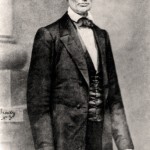
-
Lincoln in 1860
-
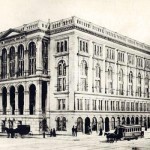
-
Cooper Union
-
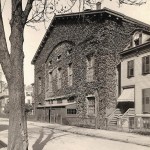
-
Plymouth Church
-
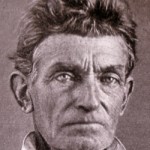
-
John Brown
-
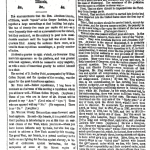
-
Page image of NY Tribune account
-
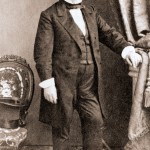
-
Stephen Douglas in 1860
Close Readings
Matthew Pinsker: Understanding Lincoln: Cooper Union Speech (1860) from The Gilder Lehrman Institute on Vimeo.
Posted at YouTube by “Understanding Lincoln” course participant Stacy Hoeflich, August 2014 (PART 1)
Posted at YouTube by “Understanding Lincoln” course participant Stacy Hoeflich, August 2014 (PART 2)
Posted at YouTube by “Understanding Lincoln course participant Stacy Hoeflich, August 2014 (PART 3)
Custom Map
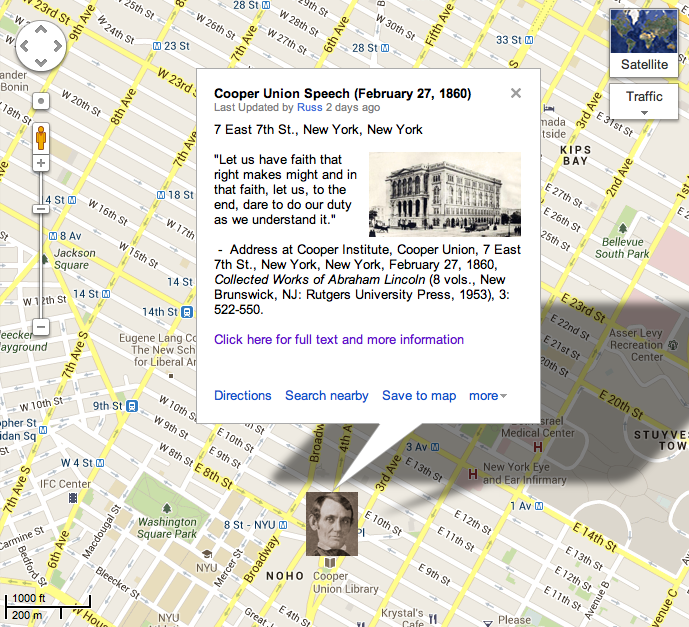
View in Larger Map
How People Responded
James A. Briggs to Abraham Lincoln, February 29, 1860
“Another Republican Orator on the Stump,” found in New York Tribune, February 28, 1860
Douglass’ Monthly, “Captain John Brown Not Insane,” November, 1859
How Historians Interpret
“One thing may be said with certainty. Had Lincoln failed at his nerve-wracking, physically exhausting, do-or-die New York debut, history would long ago have relegated his name to the trash heap of obscurity. In the words of a twentieth-century song, had he not made it here, he might not have made it anywhere. He would never have won his party’s presidential nomination three months later, or the bitter election that followed six months after the convention. He would never have confronted the agonizing choice between war and peace—to accept secession or fight to preserve the Union. And he would never have enjoyed the opportunity to strike a fatal blow against slavery, or to refashion American democracy into the global example he believed to be its rightful destiny. He would, to twist his own, later words, have ‘escaped history’ altogether.”
—Harold Holzer, Lincoln at Cooper Union: The Speech that Made Abraham Lincoln President (New York: Simon and Schuster, 2006), 2
“Harold Holzer boldly calls the Cooper Union talk “the speech that made Abraham Lincoln president.” I will be so bold as to say that it was popular sovereignty that made Lincoln president. Douglas’s Kansas-Nebraska Act and the consequent turmoil in Kansas provided the political setting for Lincoln’s return to political prominence. More than that, it was in setting forth his reasons for opposing popular sovereignty that Lincoln articulated many of his central themes: slavery’s incompatibility with republicanism, its immorality, and the threat of a ‘middle ground’ doctrine about slavery such as popular sovereignty to republican liberty. Other Republicans also expressed a moral distaste for slavery and the fear that black slavery threatened white liberty. But they more often used the events in Kansas to indict popular sovereignty as policy. Lincoln concentrated on popular sovereignty as principle. This seemingly left him closer in perspective to Douglas than to his fellow Republicans, but it also meant that Lincoln attacked the very essence of popular sovereignty while other Republicans attacked only its effects. As Lincoln consistently noted, popular sovereignty attached no moral stigma to slavery. Lincoln’s concentration on what at Cooper Union he mocked as ‘the ‘gur-reat purrinciple’ of popular sovereignty allowed him to assert the true principle of the republic: freedom.”
—Nicole Etcheson, “‘A Living, Creeping Lie’: Abraham Lincoln on Popular Sovereignty,” Journal of the Abraham Lincoln Association 29.2 (2008)
“But the speech that he delivered, reading carefully and soberly from sheets of blue foolscap, quickly erased the impression of a crude frontiersman. It was a masterful exploration of the political paths open to the nation . . . As a speech, it was a superb performance. The audience frequently applauded during the delivery of the address, and when Lincoln closed, the crowd cheered and stood, waving handkerchiefs and hats . . . It was also a superb political move for an unannounced presidential aspirant. Appearing in Seward’s home state, sponsored by a group largely loyal to Chase, Lincoln shrewdly made no reference to either of these Republican rivals for the nomination. Recognizing that if the Republicans were going to win in 1860 they needed the support of men who had voted for Fillmore in the previous election, Lincoln in his Cooper Union address stressed his conservatism. He did not mention his house-divided thesis or Seward’s irrepressible-conflict prediction; Republicans were presented as a party of moderates who were simply trying to preserve the legacy of the Founding Fathers against the radical assaults of the proslavery element. Even Lincoln’s language contributed to the effect he sought; the careful structure of the speech, the absence of incendiary rhetoric, even the laborious recital of the voting records of the Founding Fathers, all suggested reasonableness and stability, not wide-eyed fanaticism. In short, it was, as one of the sponsors wrote, an enormous success.”
—David Herbert Donald, Lincoln (New York: Simon & Schuster, 1995), 238-240
Further Reading
Searchable Text
MR. PRESIDENT AND FELLOW-CITIZENS OF NEW-YORK:
…In his speech last autumn, at Columbus, Ohio, as reported in “The New-York Times,” Senator Douglas said:
“Our fathers, when they framed the Government under which we live, understood this question just as well, and even better, than we do now.”
I fully indorse this, and I adopt it as a text for this discourse. I so adopt it because it furnishes a precise and an agreed starting point for a discussion between Republicans and that wing of the Democracy headed by Senator Douglas. It simply leaves the inquiry: “What was the understanding those fathers had of the question mentioned?”
… The sum of the whole is, that of our thirty-nine fathers who framed the original Constitution, twenty-one—a clear majority of the whole—certainly understood that no proper division of local from federal authority, nor any part of the Constitution, forbade the Federal Government to control slavery in the federal territories; while all the rest probably had the same understanding. Such, unquestionably, was the understanding of our fathers who framed the original Constitution; and the text affirms that they understood the question “better than we.”
… It is surely safe to assume that the thirty-nine framers of the original Constitution, and the seventy-six members of the Congress which framed the amendments thereto, taken together, do certainly include those who may be fairly called “our fathers who framed the Government under which we live.” And so assuming, I defy any man to show that any one of them ever, in his whole life, declared that, in his understanding, any proper division of local from federal authority, or any part of the Constitution, forbade the Federal Government to control as to slavery in the federal territories. I go a step further. I defy any one to show that any living man in the whole world ever did, prior to the beginning of the present century, (and I might almost say prior to the beginning of the last half of the present century,) declare that, in his understanding, any proper division of local from federal authority, or any part of the Constitution, forbade the Federal Government to control as to slavery in the federal territories. To those who now so declare, I give, not only “our fathers who framed the Government under which we live,” but with them all other living men within the century in which it was framed, among whom to search, and they shall not be able to find the evidence of a single man agreeing with them….
…But enough! Let all who believe that “our fathers, who framed the Government under which we live, understood this question just as well, and even better, than we do now,” speak as they spoke, and act as they acted upon it. This is all Republicans ask—all Republicans desire—in relation to slavery. As those fathers marked it, so let it be again marked, as an evil not to be extended, but to be tolerated and protected only because of and so far as its actual presence among us makes that toleration and protection a necessity. Let all the guaranties those fathers gave it, be, not grudgingly, but fully and fairly maintained. For this Republicans contend, and with this, so far as I know or believe, they will be content.
And now, if they would listen—as I suppose they will not—I would address a few words to the Southern people. I would say to them:
You consider yourselves a reasonable and a just people; and I consider that in the general qualities of reason and justice you are not inferior to any other people. Still, when you speak of us Republicans, you do so only to denounce us as reptiles, or, at the best, as no better than outlaws. You will grant a hearing to pirates or murderers, but nothing like it to “Black Republicans.” In all your contentions with one another, each of you deems an unconditional condemnation of “Black Republicanism” as the first thing to be attended to. Indeed, such condemnation of us seems to be an indispensable prerequisite—license, so to speak—among you to be admitted or permitted to speak at all….
… John Brown’s effort was peculiar. It was not a slave insurrection. It was an attempt by white men to get up a revolt among slaves, in which the slaves refused to participate. In fact, it was so absurd that the slaves, with all their ignorance, saw plainly enough it could not succeed. That affair, in its philosophy, corresponds with the many attempts, related in history, at the assassination of kings and emperors. An enthusiast broods over the oppression of a people till he fancies himself commissioned by Heaven to liberate them. He ventures the attempt, which ends in little else than his own execution. Orsini’s attempt on Louis Napoleon, and John Brown’s attempt at Harper’s Ferry were, in their philosophy, precisely the same. The eagerness to cast blame on old England in the one case, and on New England in the other, does not disprove the sameness of the two things.
And how much would it avail you, if you could, by the use of John Brown, Helper’s Book, and the like, break up the Republican organization? Human action can be modified to some extent, but human nature cannot be changed. There is a judgment and a feeling against slavery in this nation, which cast at least a million and a half of votes. You cannot destroy that judgment and feeling—that sentiment—by breaking up the political organization which rallies around it. You can scarcely scatter and disperse an army which has been formed into order in the face of your heaviest fire; but if you could, how much would you gain by forcing the sentiment which created it out of the peaceful channel of the ballot-box, into some other channel? What would that other channel probably be? Would the number of John Browns be lessened or enlarged by the operation?
But you will break up the Union rather than submit to a denial of your Constitutional rights. That has a somewhat reckless sound; but it would be palliated, if not fully justified, were we proposing, by the mere force of numbers, to deprive you of some right, plainly written down in the Constitution. But we are proposing no such thing.
When you make these declarations, you have a specific and well-understood allusion to an assumed Constitutional right of yours, to take slaves into the federal territories, and to hold them there as property. But no such right is specifically written in the Constitution. That instrument is literally silent about any such right. We, on the contrary, deny that such a right has any existence in the Constitution, even by implication.
Your purpose, then, plainly stated, is, that you will destroy the Government, unless you be allowed to construe and enforce the Constitution as you please, on all points in dispute between you and us. You will rule or ruin in all events….
…A few words now to Republicans…. Wrong as we think slavery is, we can yet afford to let it alone where it is, because that much is due to the necessity arising from its actual presence in the nation; but can we, while our votes will prevent it, allow it to spread into the National Territories, and to overrun us here in these Free States? If our sense of duty forbids this, then let us stand by our duty, fearlessly and effectively. Let us be diverted by none of those sophistical contrivances wherewith we are so industriously plied and belabored—contrivances such as groping for some middle ground between the right and the wrong, vain as the search for a man who should be neither a living man nor a dead man—such as a policy of “don’t care” on a question about which all true men do care—such as Union appeals beseeching true Union men to yield to Disunionists, reversing the divine rule, and calling, not the sinners, but the righteous to repentance…LET US HAVE FAITH THAT RIGHT MAKES MIGHT, AND IN THAT FAITH, LET US, TO THE END, DARE TO DO OUR DUTY AS WE UNDERSTAND IT.







